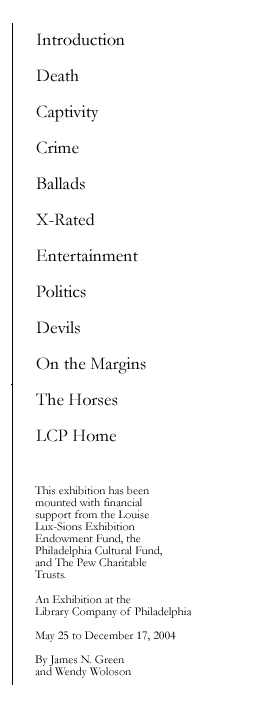

Political pamphlets were read avidly by ordinary people, but they were usually written by men with privileged access to printers and the support of political parties. Truly popular political writing is hard to find in early America, and even evidence in print of popular political activities is rare. It almost always takes the form of ephemera, that is, single pieces of paper that were meant to be thrown away when they had served their purpose. These four pieces of popular politicalephemera are all unique and unrecorded. How much more was printed that has not survived?
Ferdinando Fairfax. Ten Dollars … reward … [for] information of the person or persons who lately set fire to that part of the Blue Ridge which was the property of the late George William Fairfax. Winchester: R. Bowen, 1793.
This reward poster is indirect testimony to some popular political activity bordering on insurrection. Fairfax was heir to the remains of an estate of some five million acres in northern Virginia originally granted by Charles II to several of his noble supporters. Evidently Fairfax’s tenants were burning his woods and also logging them without permission. His agent Battaille Muse was charged with bringing the offenders to justice; Muse added a manuscript reminder that rents are due soon, suggesting that a rent strike was also in the offing.
Notice. Citizen Genet, Minister Plenipotentiary from the Republic of France, being shortly expected in this city, a Meeting of the Citizens of New-York is requested in the Fields … to express their sense on the propriety of addressing him on so interesting an occasion. New York, 1793.
Citizen Genet, ambassador from the French Republic, came to New York in 1793 seeking support for its war against England. Washington coolly proclaimed neutrality, but the common people thronged to the harbor and greeted him rapturously. The Reign of Terror just beginning soon turned most Americans against the revolutionary regime.
To John Adams, President, and to the Congress of the United States … Citizens of Boston … beg leave to express … their fullest approbation of the measures adopted by the President … to conciliate the French Republic. Boston, 1798.
As the war between Britain and France dragged on, President Adams tried to steer a moderate course between the aristocratic high Federalists who favored rapprochement with Britain and the more popular Jeffersonians who wanted peace with France. In April 1798 news of the insults inflicted by French ministers on American peace envoys (later known as the XYZ Affair) threatened to tilt American foreign policy in the Federalist direction. This petition, seemingly a slavish expression of support for Adams, is really urging him to continue negotiating with the French and not to cave in to the conservatives in his own party.
Part the Third, on Pirates. [Boston, 1775?].
These two poems or songs, one on Massachusetts governor Thomas Hutchinson’s recall to London in 1774 and the other on the Battles of Lexington and Concord in April 1775, were clearly written soon after the events by someone who was powerfully affected by them. Despite their shaky grasp of poetic language, the poems convey the heady atmosphere of the Revolution’s early days when a quick victory over British tyranny seemed within reach. The author is unknown, and no other copy of these verses exists. The title “on Pirates” seems to refer to the acrostics on the names Thomas Hutchinson, Francis Bernard, the governor who replaced him, and Thomas Gage, commander of the British army. These poems are among the most outspoken condemnations of British rulers to appear in print by that date.
